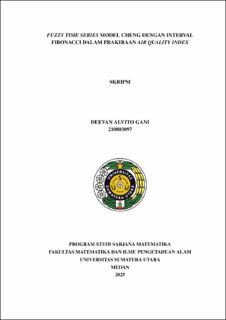Fuzzy Time Series Model Cheng dengan Interval Fibonacci dalam Prakiraan Air Quality Index
Fuzzy Time Series Cheng with Fibonacci Intervals in Air Quality Index Forecasting

Date
2025Author
Gani, Deevan Alvito
Advisor(s)
Gultom, Parapat
Hasibuan, Citra Dewi
Metadata
Show full item recordAbstract
Air quality in Indonesia has become increasingly concerning due to the rise in
urbanization and industrialization activities, making it essential to employ accurate
forecasting methods to monitor the Air Quality Index (AQI). One commonly used method
is the Fuzzy Time Series Cheng model; however, its accuracy can be affected by
less adaptive interval partitioning. This study aims to improve the accuracy of AQI
forecasting by applying the Fuzzy Time Series Cheng method using Fibonacci ratiobased intervals as an innovative approach to achieve more proportional and adaptive
interval partitioning. The data used are secondary daily AQI values from cities in
Indonesia, covering the period from 7 February 2025 to 8 March 2025, which were
then categorized based on stationary and non-stationary data patterns. The results
show that the use of Fibonacci ratios can improve forecasting accuracy for both data
patterns, with the average Mean Absolute Percentage Error (MAPE) decreasing from
12.73% to 12.26% for stationary data and from 14.59% to 13.78% for non-stationary
data. Therefore, Fibonacci intervals have been proven to be more effective in enhancing
AQI forecasting performance using the Fuzzy Cheng method.
Collections
- Undergraduate Theses [1489]
